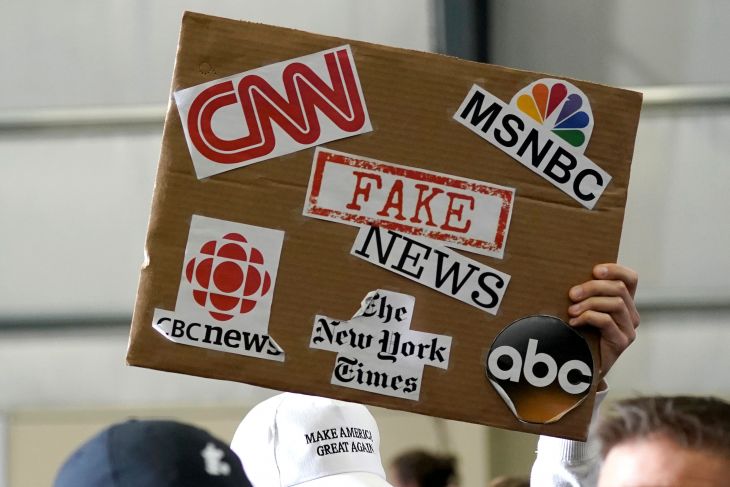Truth can be defined as the facts associated with any given issue.
Yet, the late American journalist Andy Rooney once said that people will generally accept facts as truth only if the facts agree with what they already believe.
This leads me to question whether there can be truth in media – any media.
And my answer is no.
The media is highly polarized in many countries, reflecting the political and social realities in which it operates. Each media outlet has its base public – the constant readers who share the worldview of the publication or network and who believe what their own particular media source says.
By catering to this reality, media organizations are, by default, biased to some degree to present a perception of reality and truth with which their followers can relate and that in many cases legitimizes the audience’s values and points of view.
Whether one watches CNN, FOX News, BBC or any other media, their presentations will always be subjective to a degree.
No journalist or medium can be completely objective. Each subliminally projects their values and biases and this affects their perceptions of things and how they report them accordingly.
Each of us has a foundation of beliefs that shapes our point of view. This point of view allows us to gain a perception of the truth – facts accompanied by personal values that determine the direction of any reporting.
Media is a multi-billion-dollar industry that on advertising revenues for its survival and growth.
Consequently, while a journalist may strive to present the facts as objectively as he or she can, the editor must shape the story and, importantly, its headline to attract the maximum number of readers, viewers, or clicks as possible. This in turn is reflected in ratings that are the basis for the prices that they can charge advertisers.
Thus, each story must contain elements that conform with the interests of the audience and pique their curiosity to ensure that they can be counted on to increase ratings and thus advertising dollars.
Each story presents a different point of view whether the journalist seeks it consciously or subconsciously and the audience will interpret the facts presented through their own personal prisms.
Another factor is that some media that believe in “balanced” journalism believe that they must present both sides of a story with equal conviction. This falsely leads to creating a moral equivalence between good and bad (in some cases evil) since one side’s good is another side’s bad. While balanced reporting sounds good to the purist, the result is then not a search for the truth but, rather, a legitimization of negative behavior by one side or the other.
Our world of fractured media shows us that what is truth for one is a lie for another. We kill for the sake of religious or nationalistic “truths”. Each defines “truth” according to personal values or interests and seeks to achieve a consensus less and less as media coverage becomes instantaneous through technology and biased through the laws of marketing.
Finally, because of the 24/7 cycle and the sheer number of traditional and social media sources, the “news” is now often as much entertainment as it is journalism.
It seeks scandals with disturbing regularity, casts it with a backdrop of dramatic music and “breaking news” graphics, and broadcasts it with numbing regularity.
Crises sell, and crises are important for the bottom line.
Often these crises have little to do with the fundamental global or local challenges facing us.
Last week I was subjected to mind-numbing hours on CNN of watching Johnny Depp and his ex-wife, Amber Heard, litigate their marriage live for hours on end.
Yet, while many Americans are facing the ravages of inflation to their daily purchases and the value of their savings, CNN thought that this was the major critical issue of the day.
For many around the world, CNN has a good reputation as the go-to source for news. Yet it is not immune to market forces nor editorial decisions to play the ratings game. Meanwhile, Fox News plays the radical right card completely, not so much slanting the truth but at times avoiding it completely and promoting outright lies.
So, while one medium may have more credibility than the others, the main casualty of this reality is truth.
Audiences will always see facts as interpreted by the perceptions and values of the journalist reporting them or the financial or ideological interests of the medium concerned. As well, they will filter these perceptions through their own intellectual or moral prisms.
The fragmentation and consequent politicization of media to differentiate sources is both the cause and result of the global polarization that deepens division rather than promoting consensus and progress on fundamental issues.
Absolute truth is unreachable given our own subjective minds. However, we are responsible for seeking out the closest approximation to the facts and using this knowledge to develop our perceptions and guide our actions.
And that responsibility is something we must each assume to ensure that we are not manipulated or used.
In the end, the media are going to continue their ways.
It is up to us to individually choose wisely and use the power of the pocketbook to affect the bottom line of media that we know cater to lies and misinformation.
Collectively, this can be a powerful weapon.
It’s up to us.
Edición: Ana Ordaz
Mario Bautista, director de PC de Mecayapan, señaló que sólo en su municipio, más de 400 personas han resultado víctimas
La Jornada
Posteriormente, fue liberada y deberá comparecer ante el tribunal el 4 de mayo
The Independent
Entre los candidatos se encuentran un ex ministro obligado a dimitir en septiembre y un rapero que corteja el voto de los jóvenes
Afp
También se realizó un acto de reflexión colectiva con participación de docentes
Astrid Sánchez
